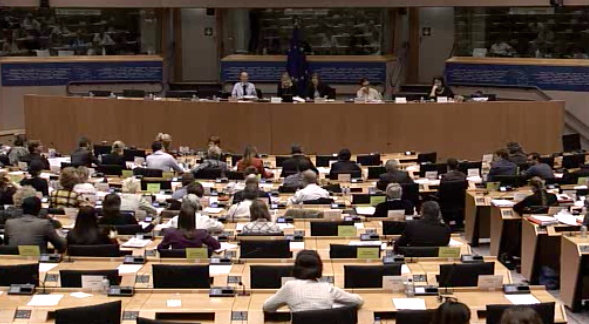Die parlamentarischen Ausschüsse im EU-Parlament setzen sich derzeit intensiv mit dem Freihandelsabkommen mit den USA auseinander und verfassen bindende Stellungnahmen für den federführenden INTA Ausschuss, der für das Plenum die Parlamentsposition erarbeitet. Heute, am Mittwoch 1. April 2015 hat der Beschäftigungsausschuss (EMPL) über seine Stellungnahme abgestimmt. In der heute verabschiedeten Stellungnahme äußern sich die Abgeordneten sehr kritisch zu dem ISDS- Vorhaben und fordern vehement den Schutz der Arbeiterrechte ein. Konkret ging es um folgende zwei wichtigen Kompromisse, an denen die SozialdemokratInnen beteiligt waren. Ein wichtiger Schritt, dass bei den Verhandlungen seitens des Parlaments Druck gemacht wird.
(viii) to ensure that agreement on any Dispute Settlement Mechanism regarding investment protection must take into account the results of the public consultation on ISDS, and is fully transparent, democratically accountable, makes explicit the right of Member States to regulate and must under no circumstances restrict or hinder legislators from passing and enforcing laws both in the area of employment and in the area of social policy for their countries; is of the opinion that a state to state dispute settlement system between the EU and US, both having fully functional legal systems and a sufficient level of investment protection to guarantee legal security, is another appropriate tool to address investment disputes; we oppose the inclusion of any form of private arbitration courts in TTIP;
(ii) to ensure, across all chapters of TTIP, that the agreement under no circumstances leads to the weakening, circumvention or invalidation of Member States and European Union standards in the following areas: workers’ rights, working conditions, social security, social inclusion and social protection, health and safety in the workplace, professional training, professional qualifications, free movement of workers and pensioners, social dialogue, antidiscrimination in the workplace and on the employment market; furthermore, to guarantee that TTIP includes comprehensive and binding provisions on labour laws and policies at all levels of Government that are in keeping with the International Labour Organisation (ILO) Core Conventions and the Decent Work Agenda; to ensure that trade or investment is not encouraged through the weakening of labour laws; where disputes arise labour provisions must be subject to a dispute settlement mechanism, including the possibility of sanctions. In this respect ILO supervisory bodies can play a role;

